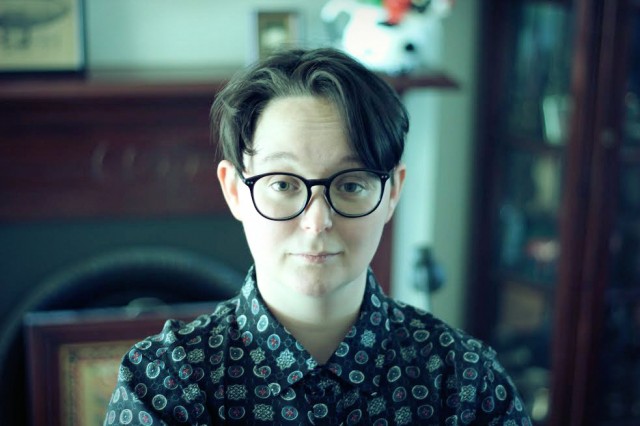29.04.17
The Faggots and The Bitchy Trans: On Community in Queer Theatre
By Charles O’Grady
Assistant to the Director, The Homosexuals or ‘Faggots’
Being trans, I have learned, is a lot about making concessions, and compromises, and sacrifices, and learning to be okay with things you’re not. Being a trans theatremaker is often much the same mentality.
There is a certain extent to which I sacrifice other parts of my identity as a trans theatremaker. Often I am in spaces as, at least in part, a consultant figure. In the best situations this dynamic is respectful and sees me treated as a human being as well as an identity, at worst I become a checklist of lived experiences that allow me, even require me, in the minds of other theatremakers, to validate or approve or wand-wave difficult elements of the work.
The process of The Homosexuals has absolutely been the former, and the most open and supportive relationship of this kind that I’ve had, but in anything I work on I am inevitably forced to pull what I (problematically!) refer to as “The Bitchy Trans”. In arguments about identity-based politic there almost always comes a point where you have to bring yourself into it and essentially exploit your own identity for the sake of a broader point. The Bitchy Trans is that moment for me – the moment where I stop trying to be a theatremaker and start saying: “You have to because I’m trans and I say so”. It’s not a moment or part of me that I like – it’s a moment I think often makes me a bit unfun – but you learn to be okay with things you’re not and you pick your battles accordingly.
***
In the rehearsal room over lunch one afternoon we discuss Matt Bomer playing a trans woman in Anything. Some say they anticipate this will be the last time a cis man is cast in a trans role of this scale and I laugh, because there is nothing at all to suggest that cis-washing for the purpose of Oscar bait will change any time soon – because the formula still works. Sure, there’s been more widespread outrage about Bomer, but that movie will still sell tickets and win awards and prove to us yet again that our identity is valid only when it is not embodied by us and our stories only have value when we are nowhere near their telling. It took us Jaye Davidson, Felicity Huffman, Hillary Swank, Jared Leto, Eddie Redmayne, Jeffrey Tambor, to stop automatically rewarding cis actors for the “bravery” of donning an oppression they can take off at the end of a day. It’s going to take a little longer before we take that next step.
Casting trans performers in Australian theatre is a different thing, most frustratingly due to a lack of accessibility for trans people in the arts until very recently. In this play we have a cisgender performer playing a transgender character — but we also have a non-binary transfeminine performer (Mama Alto) playing someone who shares that identity, a performer who has been engaged throughout the process in guiding and informing their own representation. In my own work, too, I see many young trans and gender diverse performers coming up through the ranks and slowly getting the opportunities they deserve. And that, regardless of what’s still left to achieve, is a huge step in a good direction.
In being an artist who is also a member of a minority identity, we have to reconcile ourselves to the fact that the steps we see will all be small, and will feel like a tenth of the effort we’ve put in, and take ten times as long as we want them to. What becomes the make or break moment is the active choice to persist.
***
The thing is, being a trans theatremaker is often about conceding your politics for the good of a dramatic moment.
The end of this play has been in contention since it began development. There is one ending that empowers a trans character who has been silenced throughout the whole play, and there is another which sacrifices that character to make a vital point about the oppressive cruelty of the world. Which of these endings more effectively conveys the treatment of trans people within the gay community, however, is not an answer that easily presents itself.
Everyone in the room, at some point, has had a differing opinion on this contention. Even Mama and I have disagreed about it. (Not every trans person thinks the same way about representation? Amazing.) What has made this process so worthwhile, and the final product so much stronger for it, is that this contention could exist, and that space existed for things to be prickly and complex and not easily solved – for things to be as complicated in the show as they are for the very real people these characters come from.
Most of the time as a trans theatremaker it’s about making concessions. I’m not used to being heard when it comes to these things. I was totally unprepared to be heard here. And yet I was.
Sometimes as a trans person you start to feel like the fight isn’t worth it, when everything takes so much time and energy, and the world at large is so reluctant to change. It is these moments where you “win” that keep us going.
***
I think a lot about why the arts is the main avenue by which I chose to flex my activist muscle.
Why this, fiction, representation and facsimile, of all things, when the sole statistic on trans life expectancy to be 30 years old? When every other week I read a suicide note in another trans Facebook group written by someone halfway across the world who you never hear from again? When I’m deluged by story after story about murder, assault, rape, incarceration, invalidation? When I still walk down dark streets in dread?
I think the answer is that these smaller wins matter, too. Whether or not they save lives or change policy, progress in trans representation does improve people’s experiences – particularly young trans people – and it does change minds.
And sure, sometimes it’s about wanting to escape. Even for a moment, to escape the harsh reality of existing as a marginalised member of society. But more than anything at times like this, in this political climate, in the midst of this terror and violence, I just want to see a story where the trans character wins – even if it’s unrealistic, even if it’s small, even if it’s a victory marred by sadness. Sometimes I just want to pretend we can win, even just for ninety minutes in the back of a theatre.
And I know, okay, I know, that not every play – not even every piece of queer theatre – can be for trans people. Not every play can cater to my, or any trans person’s, desires about for how we should be represented. Art can’t make us happy, or safe, or less dead.
But I want to see us keep fucking trying.
***
I could not say I agree with everything about this play. I think perhaps it would be easier for me to wave a wand over this production and tell you nothing is wrong with it, but nothing is gained by closing off that discussion. I have learned over the last three months that perfect queer representation does not, cannot, exist. There is no way to write a trans character that avoids all the pitfalls that often come with trans representation, no matter what your identity or intentions might be, because the very act of staging a non-normative body and identity invites the sensationalist.
The thing is, if we tried to make every piece of theatre a textbook example of perfect politics, a handy “How To Be Woke” guide, we would be left either with very dull theatre or no theatre at all.
So I will tell you that you should absolutely see this show in all its prickly, problematic glory. And you should talk about it, have the difficult conversations. If the show makes you uncomfortable, talk about why it did, what parts of it did, where that discomfort comes from. Is it discomfort arising from something offensive in the show? Or is it discomfort at confronting your own prejudices or foibles? Interrogate the parts of the show that make you laugh and what parts make you angry – are we as offended by every joke about a minority, or do we pick and choose based on what’s closest to home?
The very best thing we can do is continue the conversation after leaving the theatre. And, in fact, if we don’t, we are wasting the immense privilege that is the ability to access the arts.
***
There’s a lot more I want to say about this process, and about this show – about the power of comedy to pull us through community tragedy, about the importance of staging flawed and bigoted people, about the fascinating intricacy of farce – but the last thing I want to tell you is this.
On the last day of rehearsals in Sydney, we have a few drinks in the Loft. At a certain point Declan discovers that, despite my efforts to appear a cool and disaffected queer, I am also a massive musical theatre nerd. “You’re a musical theatre queen?” he laughs. “Oh my god, you are such a faggot.” And I’m touched, really genuinely touched, for a few moments until it occurs to me that that’s a weird thing to be touched by.
That moment sticks out to me, of all the moments from this room, because of the absurdity of its affirming power. What I have learned in this process is that the language of oppression is far more nuanced than the discourse of identity politics would have us believe. A word wrapped up in so much contention and violence can also contain the power to affirm someone’s sense of belonging, like a perverse badge of honour.
As a queer trans man I am frequently excluded from the broader gay male community. In working on this show I have felt accepted and initiated into a collective understanding of identity – I have become more than the trans theatremaker, the consultant, the Bitchy Trans. I found a community, which is all anyone is ever trying to do.
By Charles O’Grady
Assistant to the Director, The Homosexuals or ‘Faggots’


